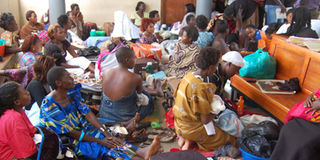Call for mobile hospitals

Mothers at Mulago hospital await treatment. Health facilities are few countrywide. FILE PHOTO
What you need to know:
Lead. Parliament should help the government see sense in ensuring that ambulatory services form part of the core service and mission of our health system
In August 2012, more than 50 civil society groups petitioned High Court, demanding that the high rate of maternal deaths – said to be 17 deaths daily – be declared a breach of basic rights. The groups hoped that pronouncement could shame the government into taking action on the preventable cases of mothers who die while giving birth.
This landmark lawsuit was impelled by two women who bled to death unattended while giving birth in hospitals. The petitioners talked of a crisis in the health sector particularly, the embarrassment of preventable maternal mortality and non-provision of essential maternal health commodities and services in public health facilities, an infringement of the right to life and to health.
Unfortunately, the Constitutional Court ruled that the issue of maternal health was a political question and therefore, must be answered by politicians.
The ruling was based on the doctrine of separation of powers in government. But what this meant in simple terms is that Parliament and Executive play a reciprocal role in the budgeting process, to the extent that, they can easily address the health concerns if they so wished. In any case, the Constitution they swore to defend and preserve, places full responsibility on the government to respect, protect, fulfil and promote the citizens’ rights to health.
Maternal mortality is a major public health challenge in Uganda. Uterine rupture remains a major cause of maternal morbidity and mortality. The statistics also show that 106 new-born babies die every day in Uganda partly due to inadequate government investment in life-saving emergency obstetric and newborn care.
At least 80 per cent of maternal deaths are caused by severe bleeding, infections, unsafe abortion, high blood pressure and obstructed labour. Lack of access to life saving HIV treatment is another major contributor to maternal deaths and this, results in high rates of mother to child transmission of HIV.
The delay in seeking care, delay in reaching health facilities for care and delay in receiving adequate care when reaching a health facility have also complicated the situation.
Mobile hospitals
In the face of the challenges, in other countries like South Africa, Zambia and in Europe, authorities are fighting back. They have adopted new approaches to health care and the tide is changing. In response to an increased emphasis on quality and effectiveness of care, authorities in these countries are refocusing their efforts on the broader care continuum —the healthcare outside the traditional hospital walls. The mobile hospitals will bring affordable, cost-effective and quality healthcare to the people.
A mobile hospital facility costs about Shs2 billion and is equipped with facilities such as X-rays, mini theatres, power and water supply, and run by trained medical staff. The van will have the capacity to reach the people who live in rural areas.
Rural population (percentage of total population) in Uganda was last measured at 86.70 per cent in 2010, according to the World Bank figures. Rural population refers to people living in rural areas as defined by national statistical offices.
In Zambia, mobile hospitals are making wonders. Parliament should help the government see sense in ensuring that ambulatory services form part of the core service and mission of our health system. For starters, each regional hospital should have a mobile hospital. With this, we would be killing two birds with one stone: Improving the health care delivery and decongesting the public hospitals.
Indifferent MPs
The Shadow minister for health, Dr Lulume Bayiga, last week also fronted this idea while presenting his alternative policy statement in the health committee. Unsurprisingly, some MPs looked indifferent even as Dr Lulume asked the government to adopt the mobile hospital services to help Ugandans in under-served and hard-to-reach areas. The Opposition view is that such hospitals would deliver services at the community level—the level five health care service.
According to Dr Lulume, mobile hospitals would consist of eight trucks, each designed to offer space for special services like, theatre, laboratory, pharmacy, outpatient and antenatal, among others.
The mobile hospital should be equipped with a general doctor, a dental surgeon, a surgeon, an obstetrician‐gynecologist, eye specialist and a nurse. However, Dr Lulume said a glaring lack of health personnel is a serious barrier to health service delivery. He proposes a pay rise of Shs2.5m for graduating doctors, Shs1.2m for clinical officers and Shs1m for nurses as a motivation to stop the brain drain.




